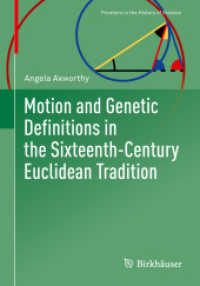- ホーム
- > 洋書
- > 英文書
- > Science / Mathematics
Full Description
This book addresses the point of intersection between cognition, metacognition, and culture in learning and teaching Science, Technology, Engineering, and Mathematics (STEM). We explore theoretical background and cutting-edge research about how various forms of cognitive and metacognitive instruction may enhance learning and thinking in STEM classrooms from K-12 to university and in different cultures and countries.
Over the past several years, STEM education research has witnessed rapid growth, attracting considerable interest among scholars and educators. The book provides an updated collection of studies about cognition, metacognition and culture in the four STEM domains. The field of research, cognition and metacognition in STEM education still suffers from ambiguity in meanings of key concepts that various researchers use. This book is organized according to a unique manner: Each chapter features one of the four STEM domains and one of the three themes—cognition, metacognition, and culture—and defines key concepts. This matrix-type organization opens a new path to knowledge in STEM education and facilitates its understanding. The discussion at the end of the book integrates these definitions for analyzing and mapping the STEM education research.
Chapter 4 is available open access under a Creative Commons Attribution 4.0 International License via link.springer.com
Contents
Foreword,Anat Zohar.- Chapter 1: Introduction, Yehudit Judy Dori, Dale Baker, and Zemira R. Mevarech.- Chapter 2: Teacher Cognition of Engaging Children in Scientific Practices, Barbara A. Crawford and Daniel K. Capps.- Chapter 3: Students' Metacognition and Metacognitive Strategies in Science Education, Shirly Avargil, Rea Lavi, and Yehudit Judy Dori.- Chapter 4: Reconsidering Different Visions of Scientific Literacy and Science Education based on the Concept of Bildung, Jesper Sjöström and Ingo Ilks.- Chapter 5: Designing for Collaborative Problem Solving in STEM Cyberlearning, Kent J. Crippen and Pavlo D. Antonenko.- Chapter 6: Technology, Culture and Young Science Teachers - a promise Unfulfilled and Proposals for Change, Randy Yerrick, Michael Radosta, and Kelsey Greene.- Chapter 7: Technology, Culture, and Values - Implications for Enactment of Technological Tools in Precollege Science Classrooms, Noemi Waight and Fouad Abd-El-Khalick.- Chapter 8: Engineering Cognition - a Process of Knowledge Acquisition and Application, Ṣenay Purzer, Tamara J. Moore, and Emily Dringenberg.- Chapter 9: Metacognition and Meta-assessment in Engineering Education, Niva Wengrowicz, Yehudit Judy Dori, and Dov Dori.- Chapter 10: The Impact of Culture on Engineering and Engineering Education, Adam R. Carberry and Dale R. Baker.- Chapter 11: Engineering Education in Higher Education in Europe, M. Sencer Corlu, Kjeld Svidt, Dorina Gnaur, Rea Lavi, Oğuz Borat, and M. Ali Çorlu.- Chapter 12: Cognition, Metacognition and Mathematics Literacy, Zemira R. Mevarech and Lianghuo Fan.- Chapter 13: Promoting Mathematics Teachers' Pedagogical Metacognition - a Theoretical-practical Model and Case Study, Zehavit Kohen and Bracha Kramarski.- Chapter 14: Mathematical Modeling and Culturally Relevant Pedagogy, Cynthia O. Anhalt, Susan Staats, Ricardo Cortez, and Marta Civil.- Chapter 15: Discussion, Yehudit Judy Dori, Dale Baker, and Zemira R. Mevarech.







